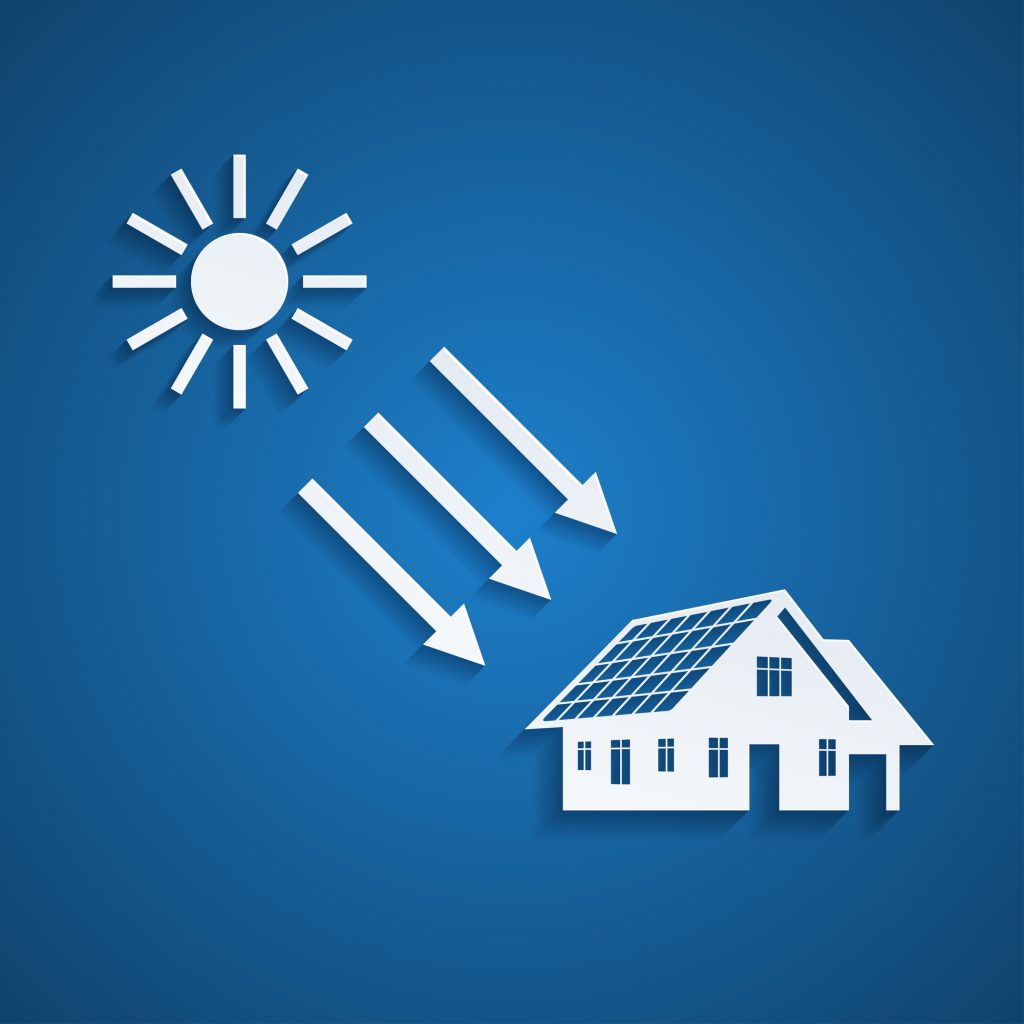Rooftop Solar Panels New Jersey | Residential Solar Power Energy | New Jersey Solar
How do solar panels work?
Solar power systems are electricity-generating devices that rely on solar panels to absorb sunlight. Rooftop solar panels are made of many individual photovoltaic cells constructed of an active semiconductor material such as silicon. When sunlight hits the solar panel, it activates the semiconductor material, producing electrical current. This process occurs in nature every day and is responsible for most renewable energy and ocean thermal power sources. Rooftop solar projects are the most common installations.
Types of photovoltaic energy systems
There are three types of basic solar electricity systems that can be used in your home.
Grid-Tied
A grid-tied home solar system remains connected to the electrical grid. Such a system generates power for the home, and it feeds any excess power it produces into the grid. The amount of electricity it feeds into the grid can slow down the residential electric meter as it measures usage. It can often make the meter go backward. When the meter “spins backward,” it means that electricity is being fed into the grid. The utility refunds the homeowner a portion of their power bill for the value of electricity supplied to the electrical grid. Typically this is done as a credit for usage and then on an annual basis the bill is trued up with a check from the utility company.
The most common sort of residential solar is grid-tied solar because it allows everyone to utilize and appreciate solar electricity while not worrying about battery backups or other concerns.
Off-Grid
Off-grid is a type of solar system in which the electricity is created by the sun and stored in a battery. Off-grid solar panels works by using a solar PV to generate power and then charging a solar battery with a charger controller. Solar system electricity is then converted to alternating current (AC) using an inverter before powering the residential or commercial equipment.
Hybrid
The hybrid system is a combination of solar electric and battery systems. The power generated by the solar PV is stored in batteries, which can be used at night or when there’s no sun. The batteries store power generated by the solar system and use this stored electricity to provide power when you need it. That makes hybrid systems useful in grid-connected or off-grid homes, if necessary.
Types of solar panels
Rooftop solar panel installation is an investment that homeowners are wise to make, but it’s essential to know your options. There are three types of solar panels: monocrystalline silicon panels, polycrystalline silicon panels, and thin-film solar panels.
Monocrystalline Silicon Solar Panels
Monocrystalline silicon panels are the most popular type of solar product on the market. They are typically more expensive than polycrystalline silicon panels, but their efficiency is better in low light areas, like cloudy days. Because they are more efficient during periods of low light, monocrystalline solar panels can produce more energy over a year than polycrystalline solar panels.
Polycrystalline Silicon Solar Panels
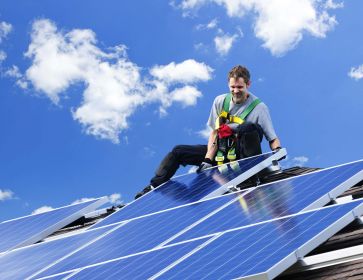
Polycrystalline silicon panels are the next most popular solar product, and they are cheaper than monocrystalline silicon panels. However, polycrystalline solar panels have lower efficiency in low light periods. Polycrystalline solar panels also collect dust more easily than monocrystalline solar panels.
Thin-film Solar Panels
A thin film is a layer of solar material that can be applied to surfaces such as glass and metal in a way that allows light to be absorbed and converted into electricity. Thin-film solar panels are cadmium telluride, copper indium diselenide (CIS), an amorphous silicon. The efficiency of thin-film solar cells is higher than that of conventional crystalline silicon, but they are more expensive to manufacture because the raw materials used are rarer.
New Jersey residential solar electricity benefits
The use of a residential solar PV system has many advantages, one being the ability to use your electricity. Instead of using electricity from a power company, you can generate your own and reduce your energy costs. Depending on the size of the solar electric system you choose, you may even be able to sell any excess electricity that isn’t used back to a local utility. Also, rooftop solar system panels are an environmentally conscious choice. The net metering standards of New Jersey say that you are paid for the excess clean solar electricity you generate at the same rate you purchase electricity at.
During the life of your solar panel system, you will be diverting what would typically be greenhouse gases emitted by power plants through your system. This also avoids mining or drilling for fuel, creating the pollution that is associated with it. The use of rooftop PV modules provides predictability in your energy costs. For example, you will know how much it will cost you each month and for a year. This allows for budgeting or planning for an energy-related project or expense.
Inverters
Inverters are used to convert the direct current (DC) electricity generated by PV modules into alternating current (AC), which is what comes out of a wall outlet and powers our homes and devices. There are two types of inverters: string and micro-inverters.
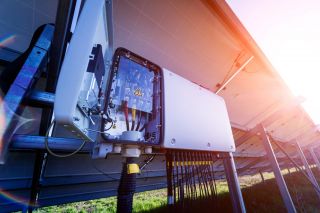
Micro Inverters
A micro inverter is a type of solar panel inverter that converts direct current power from the panels to alternating current, which a home’s electrical system can more easily use.
The inverter is the size of an internet router and is usually attached to the bottom of each solar panel installed.
String inverters
String inverters are a relatively new technology that converts direct current (DC) to alternating current (AC). String inverters have a string of solar PV connected in series so they can produce the right voltage. The string inverter turns each panel’s direct current into an alternating current that can be fed back to your home.
Power optimizers + inverter
As power optimizers, inverters reduce the amount of energy lost when converting DC to AC power by ensuring that the voltage is not over or under what’s needed by your home. Power optimizers also prevent surges and dips in power flow that damage electronics such as computers, TVs, and microwaves.
Remote photovoltaic monitoring system
A remote solar monitoring system is a high-tech device that will measure and record all the significant parameters of your solar system to allow you to assess how well it is functioning. The data will be accessible to you remotely, which means that you can check your solar panels’ performance anytime and anywhere. You can also get alerts when there are any issues with your system’s components, such as temperature too high or low. This is very useful because you can have a technician come out to your house before the problem gets serious.
Batteries for solar panel system
Batteries are the most commonly used storage system for solar electricity. The batteries store the surplus of power generated by solar PV cells during periods of high power production when there is a lack thereof; the stored energy powers the home or other buildings.
Lead Acid
Lead-acid batteries are the most commonly used storage system for solar electricity solar power. They store the surplus of power generated by solar panels during periods of high power production, and when there is a lack thereof, they power the home or other buildings.
These batteries provide both short-term and long-term use of energy storage. It’s critical to maintain a full battery charge by recharging the battery regularly, ideally with an automatic charger linked between an off-grid solar array and the battery bank.
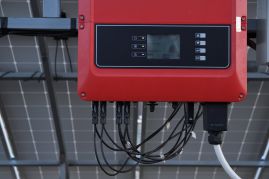
Nickel Cadmium
Nickel Cadmium is a type of rechargeable battery. It is made from nickel and cadmium. They have a better cycle life and performance at low temperatures (and are more expensive than other types of rechargeable cells). They have the ability to deliver nearly their rated capacity at high discharge rates, which is an advantage over other types of rechargeable cells. The materials are, however, more costly than those in lead-acid batteries.
Flow batteries
Flow batteries are a different type of battery system that uses two tanks. One tank is full of electrolytes, while the other one holds an identical tank. The electricity flows through the battery, which contains positive and negative ions. Flow batteries are better suited to long-term energy storage than lead-acid batteries because they have no memory effect.
Lithium-Ion
Lithium-Ion batteries are different from other rechargeable batteries because they use a mineral substance called lithium, which reassembles during the discharge period. This type of battery is more expensive than other types, but it has a longer life. Lithium-Ion batteries can provide power for hours, and if appropriately designed, they can store greater output. Lithium-ion batteries are widely used in rechargeable electronics such as cellphones and electric cars (EVs).
Battery Pros
- Can be used to buffer energy from renewable sources during peak generation.
- High efficiency
- Provides power without the use of electricity
- Storing energy allows homeowners to use less power from the grid while making up that power later in the day when their solar panels aren’t generating enough power for their home’s needs.
Battery Cons
- Limited power capacity (can’t provide electricity)
- Batteries are expensive
- Must be replaced every few years depending on use and how it is maintained.
- Not environmentally friendly and can be dangerous if mishandled.
Installing Solar Panels
Solar Building Permits
Permits for installing rooftop solar PV modules are typically obtained from the property owner’s municipality. The process of getting a permit generally includes submitting an application form and fee, receiving approval from the zoning administrator, and receiving approval from the electrical inspector.
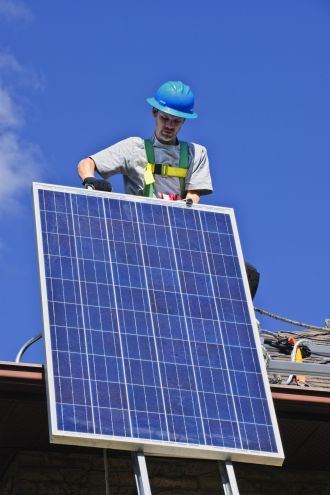
Photovoltaic panel position considerations
One consideration that must be made when installing solar panels is the position of the sun. Solar panel systems should face south to take full advantage of sunlight throughout much of the day. The angle at which the panels are installed will determine how much sunlight is absorbed by the solar cells. It is recommended that you install your panels at an angle of 30 degrees or less to maximize efficiency, which means that you may need to use a solar panel mounting system. Of course, homes are different, so the panels will be installed to take the best advantage of the sun and space.
Breaker box requirements
A breaker box is a piece of electrical equipment that breaks the circuit when there’s an overload in power. If your solar panels are wired to an existing breaker, you will need to work with an electrician to make sure your breaker can handle the extra power. If you have a breaker box, solar panels can be wired directly to it. Keep in mind that if your panel is not producing power during the day or at night, then there’s no need for the breaker to trip. The breaker will only be used if there is an overload of power, so the panels only need to produce enough power for your home.
Getting connected to the grid
Getting connected to the grid can be an expensive process. The installation cost, energy production, and transmission all contribute to the total amount needed for this step in solar panel installation. However, with the proper research and planning, homeowners can get connected to the grid for less.
To connect your own home or business, you will need a few things. According to the Department of Energy, most states require an inverter and a metered connection point before producers connect to the grid. A utility-scale solar panel installation will more than likely need an additional inspection and final approval from a local power company before it is connected as well.
When it comes to connecting your house’s energy system to the electric grid, there are a few things you should consider.
- The grid connection equipment you’ll need to connect your system to the power grid.
- Your power company will most likely have certain requirements for grid connections.
- State and local building codes and restrictions must be followed
How much does it cost to install rooftop photovoltaic panels?
Many factors affect the cost of installing a solar panel solar electricity system. These include the size, efficiency, and type of panels you choose, as well as the position and mounting used. The inverter is also crucial in determining how much it will cost to install your system. There are ongoing running costs associated with covering your roof with solar panels, but these are usually very small.
If you’re thinking of getting a rooftop solar system installed, it’s essential to consider the total lifetime costs as well as initial installation costs. You can use an online calculator to determine your potential savings and how long it may take for the system to pay for itself.
New Jersey’s average cost of solar panel installation is $11,730 to $15,870. In terms of cost per watt ($/W), a solar panel installation in New Jersey ranges from $2.35 to $3.50 statewide.
The solar payback period is a crucial factor to consider for individuals considering installing solar panels. A shorter payback period means you can recover your investment sooner but does not account for any possible future price increases in the cost of solar panels. Most companies will offer a free estimate based on a design that meets your exact needs and desires.
Solar Panel Cost
The solar panel cost is determined by the size and construction of the solar panel. In general, the higher the output wattage for the size of the panel will result in an increased cost per panel. New Jersey solar panels do not need the hurricane ratings of some Florida panels and this helps to keep costs down.
Photovoltaic financing
There are a few financing options for those who want to purchase a solar electricity system.
Direct loans
A direct loan using a solar finance company is a way to pay for your solar installation monthly. A direct loan using a solar finance company is a way to pay for your solar setup in monthly installments. This option provides no-money-down and low-interest rates as well as the opportunity to deduct the interest from your federal taxes. You can also take out a mortgage which could turn out to be cheaper in the long run. Only working with your solar consultant or financial advisor can tell you if this is right for you. If you are going for outside financing it is a good idea to get multiple quotes.
Incentives from electric companies
Many power companies have incentives for those who choose to install solar panels on their homes. These incentives usually take the form of a rebate or discount on your monthly payments but may require you to sign a long-term contract for a set number of years. You may be able to sell excess power generated by your solar panels back to the utility company.
Solar leasing
Solar leasing or lease PPA solar is a sort of rental in which you allow a third party to put solar panels on your house and benefit from lower electricity expenses. The savings are generally reflected in your monthly bills. After the lease term, you have the option of purchasing solar panels, but this will be determined by what is covered in your contract. This can be a good option for those who do not work but want to save money on their electric bill. The solar system owners get the tax benefits. Just ask about a solar lease PPA. There are people/companies who invest in solar systems. They are known as a system third-party developer. Third-party developer third-party developer homeowner are typically the beneficiaries of solar incentives solar rebates.
A solar system third-party developer installs, owns, and maintains a photovoltaic system on your home or business. Because the developer owns the system, you don’t have to pay for installation costs or equipment upgrades. You will pay a monthly or yearly fee that is less than what you would have paid if you had not used solar.
It is critical to inquire about any potential tax credits you might be eligible for when obtaining financing for solar panels. It is also helpful to find out the company policy for removing the panels if you move or sell your home before the end of your contract.
Tax Credits & New Jersey Photovoltaic Incentives
Solar Investment Tax Credit or ITC
The federal solar tax credit (ITC) is a permanent tax credit for new solar projects introduced by the PATH Act of 2015 and extended to 2019 and since amended. This tax credit has been a major driving force behind the expansion of solar energy in the United States.
The federal solar tax credit is a 26% rebate for residential and commercial installations through 2022, after which it will be reduced to 22% in 2023 and then to 0 in 2024. This applies to every component and all labor on the system.
The federal solar tax credit is a dollar-for-dollar reduction in your tax liability, meaning you get back an exact percentage of the amount you put into the system. This is a nice break for property owners.
SREC’s
To be eligible for payments in New Jersey’s incentives programs, you must have a solar renewable energy certificate or SREC. This is also paid to the property owners. ( successor solar incentive to the SREC is the SREC II ) NJ is very generous with their program. As of August 28, 2021 it is about $90 per megawatt generated.
Solar Renewable Energy Certificates or SREC’s are certificates that represent a one-megawatt hour of NJ solar electricity and can be sold to other entities, which in turn can be sold to the government. Incentive program SREC and now SREC II can substantially lower your monthly costs.
Jersey Solar Incentives
There may also be financial incentives available at the municipal level. Depending on the state you live in, there may be tax deductions or credits for solar installations, as well as property tax exemptions or reductions.
New Jersey solar energy incentives are covered by a few renewable energy programs and tax credits to encourage investment in NJ solar energy. New Jersey’s renewable energy incentives are among the best in the country. All parts of their energy efficiency programs. The Solar Renewable Energy Certificates (SRECs) and the Solar Investment Tax Credit (ITC) are available to homeowners who install residential or commercial solar installations. So as you can see, New Jersey has a very generous solar incentive program.
One of the most important things to consider is your state’s net metering law. Net metering law defines how much excess energy you get paid for at the end of the year. The more money you get, the better because that means your solar system is generating more power than you’re using. And while New Jersey’s net metering policies are among the best in all 50 states. Be sure to do your research and see what works best for you.
Property Taxes
One of the most important things to consider with property taxes is whether or not you can qualify for the exemption. A residential property that generates its solar energy through PV solar panels can be exempt from a property tax increase that is the result of an increase in the value of your home due to solar. The amount of tax deductions depends on the state you live in and the size of the system installed. NJ will give you an exemption for the increased value.
Sales Tax
Sales tax incentives are available on solar purchases throughout the United States. One of the most common sales tax incentives is the federal sales tax exclusion, excluding installation costs from local and state sales taxes.
If your property is located in New Jersey, you are eligible for an exemption from Sales Tax on solar equipment purchase and installation costs. Thank you, NJ.
Frequently Asked Questions
What are other popular photovoltaic utility projects
A warehouse rooftop is an ideal place to install solar.
The data center industry and the colocation industry are huge power hogs. Solar can help offset this. and according to waste today magazine – sanitary landfill facility gets renewed use from the installation of solar arrays. https://www.wastetodaymagazine.com/article/solar-panels-landfills/
What is a community photovoltaic program?
Also known as community solar energy, The U.S. Department of Energy defines community solar as any solar project or purchasing program, within a geographic area, in which the benefits of a solar project flow to multiple customers such as individuals, businesses, nonprofits, and other groups. … Community solar is rapidly growing across the country. “Solar Rebates And Incentives | Cleanenergyauthority.com.” Solar rebates and incentives | Cleanenergyauthority.com. www.cleanenergyauthority.com. Accessed September 17, 2021. https://www.cleanenergyauthority.com/solar-rebates-and-incentives.
Renewable energy program community solar projects make it possible for members of the public to buy into a local solar installation. A community photovoltaic (PV) system is set up on someone’s property; they become the host site owner, and they sell shares or memberships in the system to people who want access to solar electricity.
What are the benefits of photovoltaic utilities?
Residential solar energy system is a renewable resource, meaning that it will never run out. Solar panels can last for decades, depending on their quality and brand. Sunlight is free, unlike other energy sources, which require extensive investments to access. When you generate your solar electricity through PV solar, you are doing your part to reduce the overall carbon footprint of your community by producing clean solar energy. Solar panels also reduce pollution by limiting emissions from coal power plants.
Is there a limit to how much clean photovoltaic electricity you can generate on the roof?
There are no limits to how much solar energy you can generate except installation space. However, the amount of available sunlight does limit how much energy your PV solar panels can produce in a day. The solar panel’s design plays a role. If you live in an area with little sunlight year-round, then it may be difficult or impossible to generate enough power for your needs.
What factors determine how much electricity my photovoltaic panels system will produce?
The amount of electricity a solar panel system can produce depends on a variety of factors, including the size and quality of the panels and the number and intensity of sunlight. Solar panels can also be shaded by trees or other structures, which will reduce production.
How long do PV or photovoltaic panels last?
Solar panels can last for decades, depending on their quality and brand. It is estimated that solar panels will lose about 1/2% of their capacity every year after installation, and this degradation slows down over time. A high-quality solar panel should be able to produce up to 80% of its original power output after 25 years of usage.
What factors affect photovoltaic panel efficiency?
Solar panel efficiency is determined by the size of the solar cells within them and how efficiently they can convert sunlight into energy. Solar panels typically have an efficiency rating between 12%-20%. The most advanced solar panels can achieve an impressive 22% efficiency rate.
What is net metering law?
Net metering law is the standard used to determine how much excess power you can sell back to your utility company at the end of each year. Essentially, this sets forth how much money you’ll receive for the additional energy that your system produced over what you used throughout the year.
How long does it take for a photovoltaic panel system to pay for itself?
Many variables affect the payback period. There has been a significant solar panel price drop. Generally, solar energy systems take between 10-15 years to produce enough electricity to equal what was spent throughout the entire installation process. This means you will see financial benefits within 4-7 years since you begin saving money on your utility bills immediately after purchase. Over the life of solar energy systems, they can save you tens of thousands of dollars. Let’s face it, installing solar panels is smart.
Who qualifies for property tax exemption if their property generates its own electricity through PV solar panels?
If you live in New Jersey, then your property may be eligible for a property tax exemption. If your home increases in value – (which it will), you may be exempt from paying property tax on the increased value.
Does my state offer any types of incentives for buying a photovoltaic panel system?
As one of the top states for solar energy production, New Jersey offers many different incentives to encourage homeowners and businesses to switch to solar PV. Many federal incentives apply to all 50 states. Be sure to investigate the various forms of aid available in your state before purchasing a solar system.
Do I need professional installation of home photovoltaic panels system in New Jersey?
A qualified installer is needed for any solar panel system in NJ. Solar panels are heavy and can weigh up to 100 pounds or more. Even small setups require at least two people to carry the panels. There is also electrical wiring that needs to be installed correctly to prevent short circuits, which could cause fires or electrocution. If you do not have prior experience with a residential solar system it is best to hire a professional installer. Safety should be your first concern.
Solar Electricity System Warranties
If you install solar panels yourself, then it is essential to be aware of the warranty. Most reputable, national companies offer a 25-year warranty on all their systems, and this will cover any system, whether it is a residential or commercial system. Today there is even an option for a 30 year “bumper to bumper” warranty. There are many different programs and services available.

